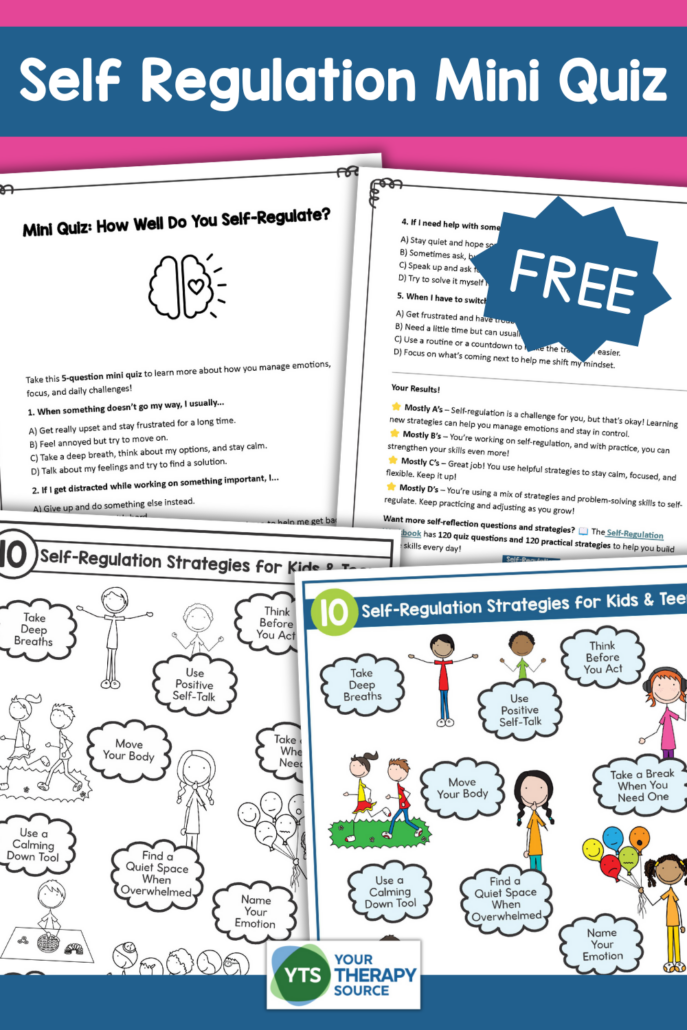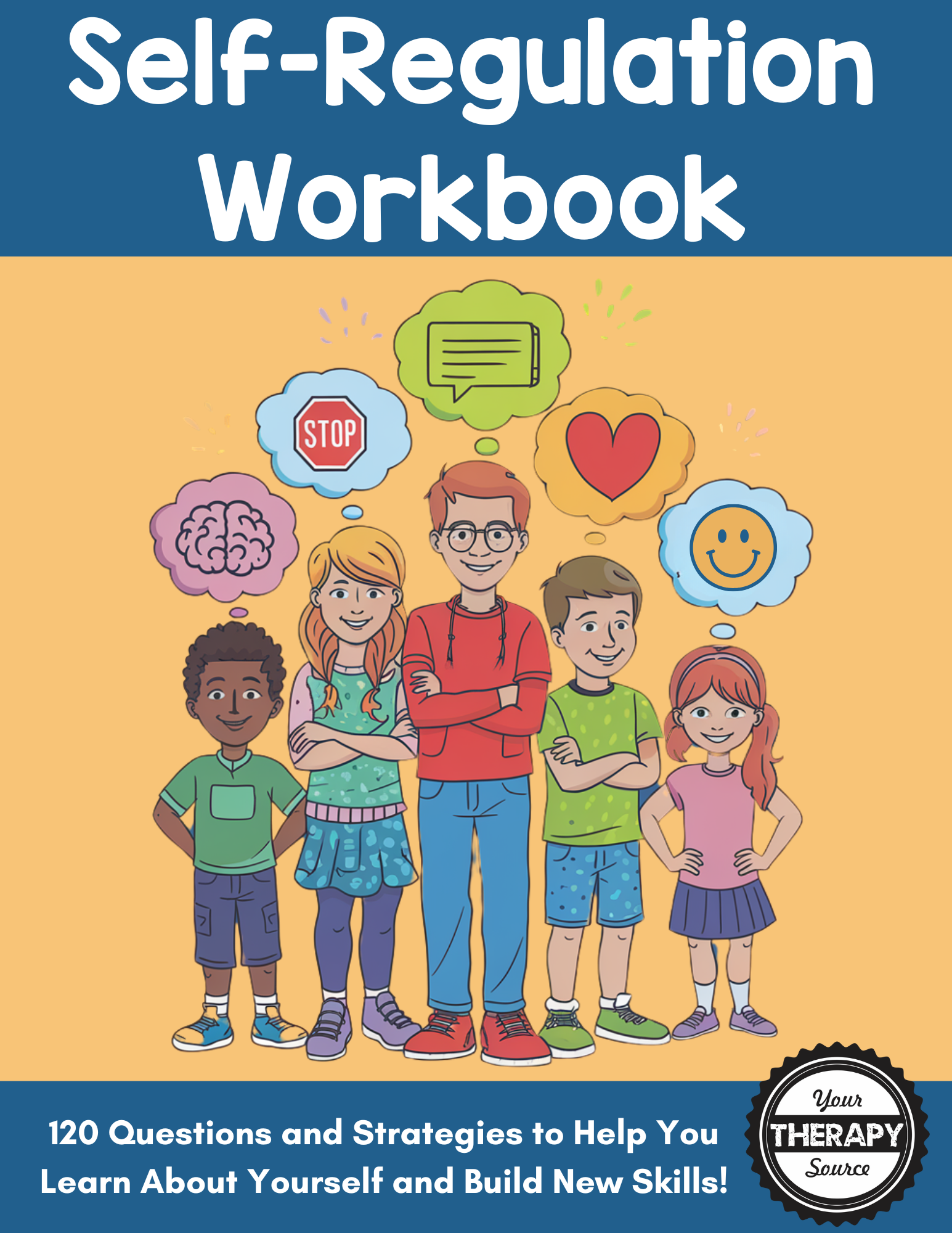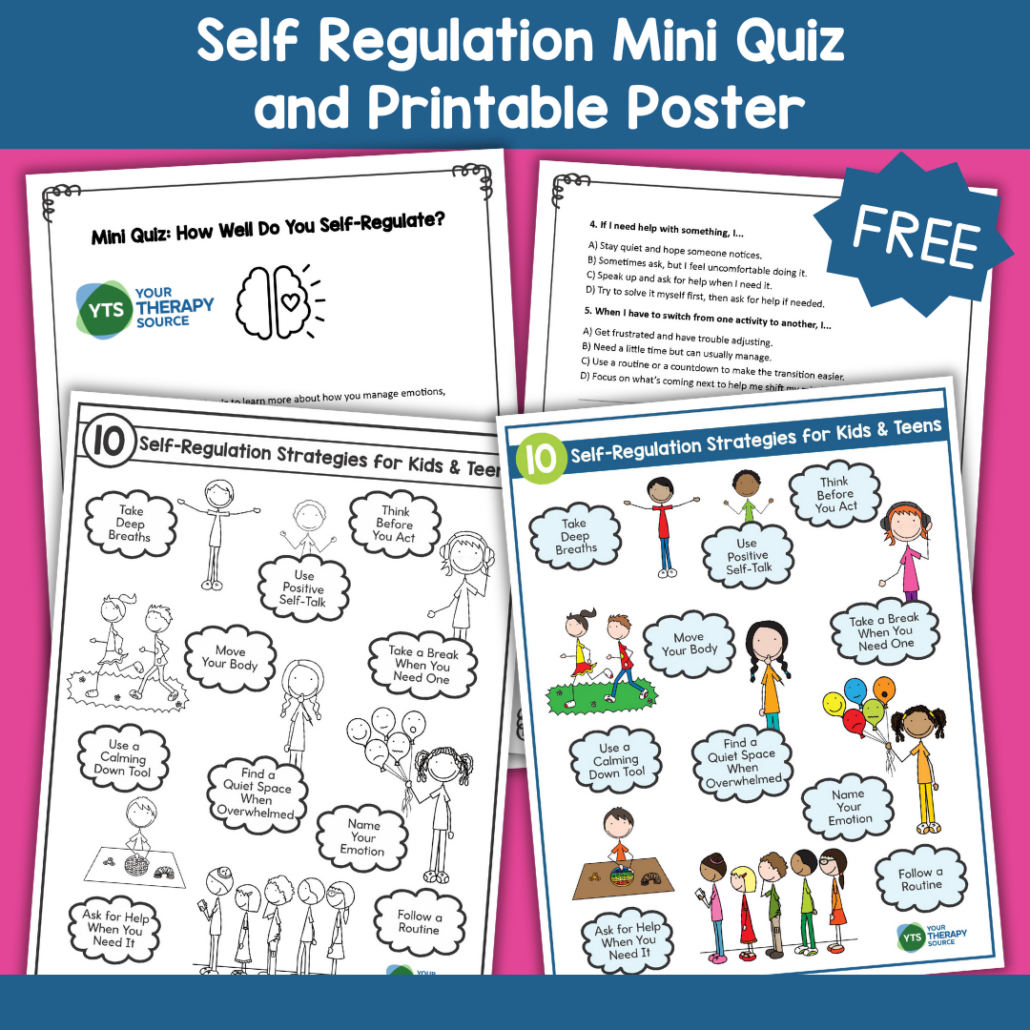Self Regulation Mini Quiz and FREE Self-Regulation Strategies Printable
Self-regulation is an essential skill that helps children and teens manage emotions, focus their attention, and navigate daily challenges. Whether at school, home, or in therapy, learning self-regulation strategies can make a significant difference in building confidence and resilience. To support this growth, we’re offering a FREE Self-Regulation Mini Quiz and Printable Strategies Guide! This resource helps kids and teens reflect on their self-regulation skills and discover practical strategies they can start using today. Check out the complete Self Regulation Workbook here to get 120 quiz questions and strategies!
You can download it at the bottom of the post for free.

What is Self-Regulation?
Self-regulation is the ability to understand and manage emotions, thoughts, and behaviors in different situations. It allows kids to stay calm when they feel frustrated, make thoughtful decisions, and adapt to changes more easily.
Strong self-regulation skills help with:
✅ Managing emotions in difficult situations
✅ Paying attention and staying focused
✅ Making better choices instead of acting on impulse
✅ Handling transitions and changes smoothly
✅ Asking for help when needed
If self-regulation is challenging, don’t worry! It’s a skill that can be developed with practice, and this mini quiz and printable strategies guide is a great place to start.
The Benefits of Self-Assessment with a Fun Self Regulation Mini Quiz
Self-assessment is a powerful tool for building self-awareness and improving self-regulation. When kids and teens take the time to reflect on their emotions, reactions, and behaviors, they begin to understand what works well for them and where they might need support.
A fun quiz makes self-assessment engaging and approachable! Instead of feeling like a lesson or a lecture, it encourages kids to think about their own experiences in a relaxed way.
Why Self-Assessment Helps with Self-Regulation
✅ Encourages Self-Reflection – Kids gain insight into their emotions, behaviors, and decision-making habits.
✅ Builds Awareness of Strengths & Challenges – They recognize what they already do well and what they can improve.
✅ Provides a Starting Point for Growth – Knowing where they stand helps them take steps toward positive change.
✅ Makes Learning Interactive & Fun – A quiz feels like a game, keeping kids engaged in their self-regulation journey.
✅ Promotes a Growth Mindset – Kids see that self-regulation is a skill they can improve, not something they either “have” or “don’t have.”
The Self-Regulation Mini Quiz is a great way to start this journey. Once kids and teens understand their self-regulation strengths and challenges, they can use practical strategies (like the ones in the free printable) to build their skills over time!
Take the Self Regulation Mini Quiz!
How well do you manage your emotions, focus, and daily challenges? This 5-question mini quiz helps kids and teens reflect on their strengths and areas for growth.
👉 Download the Self-Regulation Mini Quiz to take the quiz and find out how well you self-regulate! You can sign up below.
After completing the quiz, review your results to learn whether self-regulation is a strength or something you can improve with helpful strategies.

Self Regulation Workbook – Learn About Yourself
Free Printable: 10 Self-Regulation Strategies
Along with the quiz, we’re also giving you a FREE printable featuring 10 self-regulation strategies that can help kids and teens build essential skills. Using these strategies regularly can help children and teens stay calm, focused, and in control of their emotions and actions.
📌 What’s included in the free printable?
- 10 simple self-regulation strategies with easy-to-follow directions
- A coloring page format to make learning interactive
- A great resource for classrooms, therapy offices, or home use

10 Self-Regulation Strategies for Kids & Teens
- Take Deep Breaths – Slowly breathe in through your nose like you’re smelling a flower, hold it for four seconds, then breathe out through your mouth like you’re blowing out a candle. Repeat a few times to help your body feel calm.
- Use Positive Self-Talk – When you’re feeling frustrated or upset, remind yourself of something encouraging. Say, “I can do this,” “I will try my best,” or “It’s okay to make mistakes.” Positive thoughts help you stay in control.
- Think Before You Act – Before reacting, pause and ask yourself, “Is this the best choice?” Take a moment to think about how your words or actions might affect you and others before making a decision.
- Take a Break When You Need One – If you’re feeling overwhelmed or frustrated, step away for a few minutes. Take a short walk, stretch your body, listen to calming music, or grab a drink of water to reset your mind.
- Use a Calming Down Tool – Find something that helps you relax, like squeezing a stress ball, using a fidget toy, drawing, coloring, or listening to soft music. These tools help give your hands and brain a break.
- Move Your Body – Physical activity helps your brain and body reset. Try jumping jacks, running in place, stretching, dancing, or even shaking out your arms to release energy and refocus.
- Find a Quiet Space When Overwhelmed – If loud noises, bright lights, or too much movement make you feel stressed, find a calm and quiet spot where you can take a break, breathe, and relax.
- Name Your Emotion – When you’re feeling upset, sad, or frustrated, say it out loud: “I feel angry,” “I feel excited,” or “I feel nervous.” Naming your emotions helps you understand them and decide what to do next.
- Ask for Help When You Need It – If something is too difficult or you’re feeling stuck, talk to a trusted adult, teacher, or friend. Asking for help shows strength and helps you learn new ways to handle challenges.
- Follow a Routine – Having a daily plan helps transitions feel easier. Try following a morning checklist, setting reminders for important tasks, or creating a bedtime routine to make your day feel more predictable and manageable.

Raising Self Regulated Kids Issue #1 – The Science Behind Self Regulation
Want More Self-Regulation Tools?
The Self-Regulation Workbook provides a closer look into self-regulation, with:
✔️ 120 self-reflection questions to help kids and teens understand their habits
✔️ Practical strategies to improve emotional and behavioral regulation
✔️ Easy-to-use quizzes and activity pages for learning at home, in therapy, or at school
This workbook is designed for educators, parents, and therapists looking to help kids develop lifelong self-regulation skills in a fun and engaging way.
Download Your FREE Self Regulation Mini Quiz & Strategies Printable!
🎉 Ready to start building self-regulation skills? Download your free 4-page self-regulation printable below and start exploring strategies today!



